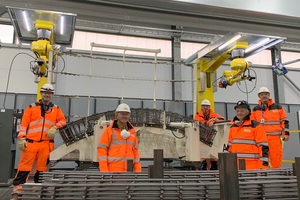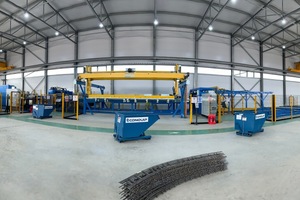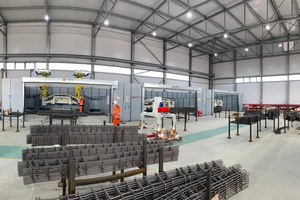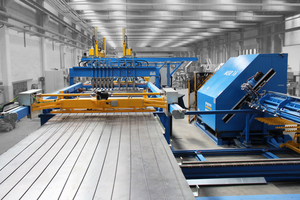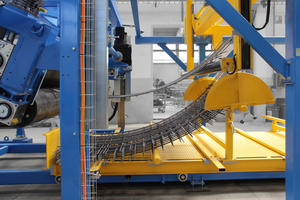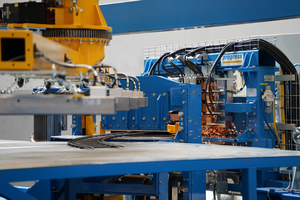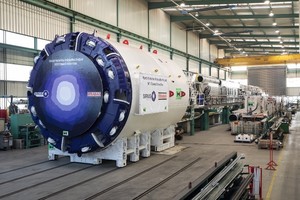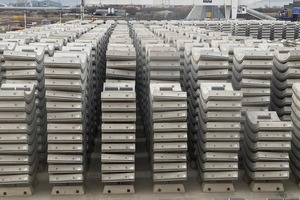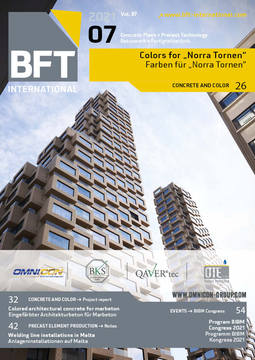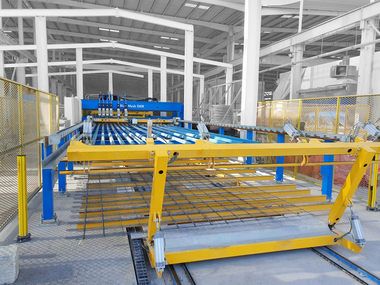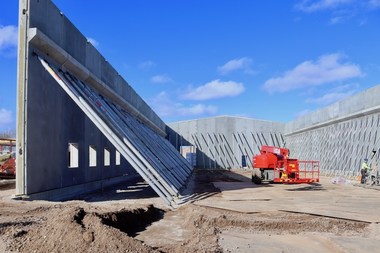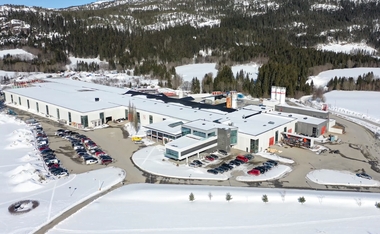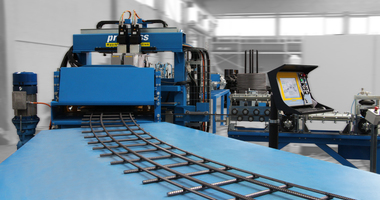Strabag AG uses Progress machines for constructing cutting-edge sustainable tunnel systems
For its tunneling projects, Strabag AG relies on custom machines delivered by Progress Maschinen & Automation, a member of the Progress Group. For a project in North Yorkshire, United Kingdom, Strabag set up a dedicated precast plant on the job site and ordered an M-System BlueMesh mesh-welding machine with a mesh-rolling unit, a Tunnel Master ladder-welding machine and an automatic EBA S 16 stirrup bender from Progress.
A global presence in 30 countries
As a European technology partner for construction services, Strabag AG is implementing complex projects going far beyond conventional road construction. Strabag SE, of which the German Strabag AG is a subsidiary, is leading the market in roads and infrastructure, building upon a tradition of over 90 years. Its portfolio covers all areas of the construction industry and extends along the entire construction value chain. Strabag AG has a global presence in about 30 countries and has been operating in the United Kingdom since March 2011 in the fields of building construction and civil engineering, tunneling and ground engineering. The company continues to actively explore further business opportunities with a focus on tunneling and infrastructural development.
A groundbreaking project
In the northeast of England, right in the middle of North York Moors National Park, a 37 km long transport tunnel system is currently under construction. The Strabag North Yorkshire Polyhalite Project forms part of the Woodsmith Project owned by Anglo American, one of the largest mining companies worldwide. This project is to ensure the transport of mineral extracted from the world’s largest deposit of polyhalite, a mineral used for producing fertilizer. Of the 2.66 billion tons of polyhalite estimated for the deposit, 280 million tons are located within an area of 5 km around the planned mine, which represents only 7% of the resource area specified for the project.
Owing to the rapidly growing global population and the increasing degree of urbanization, an increasingly large amount of fertilizer is needed for ensuring efficient food production. Polyhalites are a sustainable solution to this problem. This mineral is extracted through mine shafts from a depth of 1.5 km and conveyed through the underground Mineral Transport System (MTS) to the processing facility in Teesside. After processing, the product is transported to the port and its lion’s share exported overseas.
Strabag won the contract for designing and building the 37 km tunnel and transport system.
Challenges in tunneling
The biggest challenges in tunneling relate to implementing the necessary safety precautions and conceiving an appropriate evacuation strategy. Demanding safety standards, a tight schedule, previous funding problems and amendments to existing contracts have created additional challenges for this project over time, but the close collaboration with the customer’s on-site team made it possible to achieve the best results under the circumstances.
Towards greater sustainability
Starting with the design phase, the entire project has been guided by the principles of sustainable construction causing the lowest possible environmental impact. As such, the MTS is an environmentally friendly option for the mine that eliminates the need for using roads or other types of aboveground transport. The precast plant set up close to the project site rounds off this concept. Raw material sourcing is subject to a sustainable procurement policy, which is why the decision was made, at an early stage, to source sand and aggregates from local quarries and to define transport routes that leave the national park undisturbed. The modern hybrid tunnel locomotives running on diesel fuel and electricity rely on kinetic energy recuperation in order to optimize utilization of the steep incline and length of the tunnel, which radically reduces emissions and minimizes the required degree of ventilation.
Efficient tunnel segment production
Tunnel segments are components of the outer shell of a shaft or tunnel. At Redcar, a town in the North Yorkshire County in England, the tunnel segments are produced in a field factory, thus eliminating long hauls. The entire production line is designed for a tunnel-boring machine (TBM) advance rate of 20 m per day. The expected productivity was achieved by using local workforce, many of whom had previously been inexperienced in producing tunnel segments. They acquired the necessary skills after a learning curve of only about three months. The higher-than-anticipated actual production output of over 17 segments per day (equivalent to a tunnel length of 26 m) was even surpassed by the daily advance rate of up to 52.65 m that the TBM achieved. Additional innovations in segment production included the use of robots and an automated welding process for rebar cage fabrication.
Many years of experience in sophisticated tunnel projects
Progress Maschinen & Automation closely collaborated with Strabag to develop custom solutions for the tunneling projects jointly undertaken, thus ensuring a consistently high quality standard and functionality of the finished products. For this purpose, the project partners customized an M-System Blue Mesh mesh-welding machine with a mesh-rolling unit to the specific project needs. This flexible production system welds rebar steel mesh from the coil to custom specifications while perfectly meeting the related requirements. The required production data is imported from the structural designer’s software as a bending list, processed further and transferred to the machine, ensuring rebar fabrication exactly to the required lengths and spacings.
The Progress Tunnel Master ladder-welding machine produces straight and curved ladders from the coil. This robust, low-maintenance welding machine is designed for the quick and low-cost production of reinforcement for tunnel segments. The Tunnel Master processes up to four longitudinal wires arranging them in a continuously adjustable grid; the same principle applies to the cross-wires. This setup thus allows for the quick, technically sophisticated, low-cost production of straight and curved ladders from the coil for tunnel segments and similar precast elements.
Combined with the fully automatic stirrup bender, Progress thus provides a complete solution for producing the reinforcement for tunnel segments. The stirrup bender is part of the EBA S series and can process wire diameters from 6 to 16 mm. EBA S stirrup benders are easy to operate and achieve a very high output and precision thanks to the integrated top-class control unit. This latest machine generation excels with its particularly high flexibility and low operating, maintenance and wear part costs.
Complete reinforcement solution for tunneling
Specially designed robots weld the prefabricated ladders, meshes and stirrups to finished rebar cages in a fully automatic fashion. For the North Yorkshire tunnel project, Progress machines thus ensure the fabrication of the complete range of reinforcement in an automated, time-saving process.
“The cooperation with Progress for developing the equipment for this exceedingly specific project has been outstanding,” comments Kurt Usel, expert, development engineer and Project Head Automation at Strabag AG. He adds, “Particularly when developing such prototypes for an active job site with only a few testing options, it is crucial to ensure a close collaboration within the team. This team-working effort was successful, and we have been producing the items required for robot-assisted welding in the required quantities and to the specified quality standard since autumn 2020.”
The entire Progress plant design corresponds to the Strabag targets and objectives and paves the way towards manufacturing high-quality products at the factory with only a few variables in the production process in order to stay competitive in the long term. The ongoing trend towards a higher degree of automation is also increasingly becoming visible in the fabrication of reinforcing steel. Construction contractors can join forces with Progress to leverage automated processes for greater efficiency.

